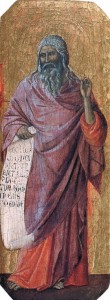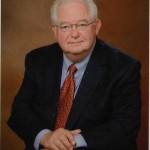Isaiah 1:1, 10-20
This text is used for the Lectionary Year C on August 7, 2016.

Like an artist, Isaiah shapes a vision into a word; a hard yet good word that seeks to form the language of God and transform the people of God; hard in the sense that it holds nothing back, truth-speaking even when the truth is too hot to handle.
Isaiah has hopes for the people to be alive with wonder to the presence of God. He confronts them with the concrete particulars of the life they are living. He challenges them to examine the mundane and ordinary realities of their everyday existence in light of the multiplicity of ways God desires to take this raw material to transform the world in which they live.
This urban prophet brings a strong word imploring the people to give over their lives to this powerful, compassionate God. Their lives nullify the worship they are performing. What is the purpose of going through the motions of worship when our everyday lives do not live out such praise?
Isaiah, the son of Amoz, shares the vision he has received for Judah (the Kingdom) and Jerusalem (the capital) (1:1). His words read like a personal memoir with a sense of heartache (1:2). The people are in a cut-off from God and estranged from each other. Their whole head is sick and their whole heart is faint (1:4). With faint hearts for God they have no heart for others. This Hebrew wordsmith hopes to make their existing narrative evident.
Upon this platform Isaiah makes his case. His vision spoken in the dark of night brings the light of day, when things of faith are hard-pressed, when times are tough. He has high interest in his people long before they are interested in what he has to offer, when there is fat chance they will care.
Isaiah beseeches the people to “Hear the Word of the Lord.” He uses the language of association in order to get their attention, “You men and women with a degree from Sodom. Hear what God has to say to you.” This is a blunt word to people who are going through the motions making perfunctory sacrifices out of their seeming devotion to God (1:11). “Enough already. Stop in the name of love!” God has had it “up to here” with your token expressions of devotion. It is futile. God could care less about your faint praise. Your festivals wear God slick and weigh God down.
Isaiah brings the Word of God for the people of God in clear and no uncertain terms, “Your wordy prayers are like jabber to me. I will not listen. Your prayers are well rehearsed but hardly well-versed. So much, ‘Blah, blah, blah, blah, blah!!’”
“Therefore, if you stretch out your hands to me, I will hide my eyes from you.” God is ready to cut off his people; closing his eyes and plugging his ears. Isaiah preaches with great clarity. His reprimand is blunt and to the point.
Tell me about your favorite teacher. I imagine they had this particular gift of clarity of expectations. Isaiah is not the most quoted prophet by accident. His message hits the target a high percentage of time. However, his message is not shared in order to simply put the people down but to lift their eyes and hearts to new sights. He offered a new mark on the horizon toward which to proceed. His goal setting is equally as clear. “Learn to do well / seek justice / correct the oppressor / vindicate the fatherless / plead the clause of the widow (1:17). Unlike the long-winded pastor who has no clue when he or she has used up all of his or her syllables, Isaiah closes without being redundant. He brings matters clearly into focus, “Settle your hearts on justice.”
He closes by asking them to reason things through with him (1:18). However, his tone of voice may not be as tender as in the song we have learned to sing of this verse. Perhaps the New English Bible translation provides insight for us when it translates these words, “Come now, let’s argue this out!” In other words, it is time to give God the opportunity to make a strong case against you. Worship is not so much to be a way in which to appease God in order to get God off our case. Rather perhaps it is better understood as a way in which we invite God to make a good case even against us. Worship is not an effort to balance God out of the formula, but an opportunity that might stir God’s very spirit into motion within us and through us. Worship relies upon God being the common denominator of all things.
Isaiah makes a persuasive case for renewal. “Though your sins be as scarlet they shall be white as snow” (1:18), a trade worth taking every time. There is no need for more words from us, more half-baked promises that we will try to do our best. God provides the curious question: “Is your best going to do justice or not?”
Isaiah has crafted a vision to make the Holy One present. The name Isaiah means “The Lord delivers.” Isaiah is convinced that the one who delivers is the Holy One of Israel, an expression that occurs twenty-eight times in Isaiah. This name is characteristic of God. For this reason, we should press to be holy in all things. God desires to work with the ordinary stuff of our existence. God is willing and able to deliver us and shape us in holiness. Let this be clear: God is the ultimate ecologist. In God nothing is wasted. God desires to use the slender threads of our existence to create, and save, and to give hope.
 Stephen D. Graham
Stephen D. Graham
Coordinator
CBF Oklahoma
sgraham@cbfok.org
Tags: going through the motions, mundane and ordinary, slender threads existence, reprimand, goal setting and affirmation, ultimate ecologist, urban prophet
